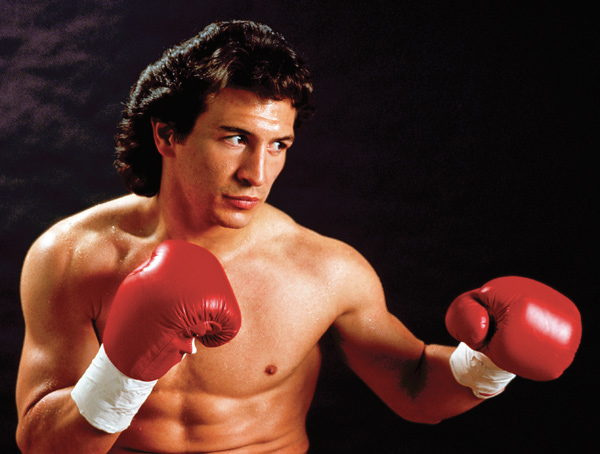Mancini has date with HOF


Lightweight boxing champion Ray “Boom Boom” Mancini poses for a publicity photo in March 1989. On Thursday, the Youngstown native was notified that he was one of the 2015 International Boxing Hall of Fame inductees.
“I NEVER THOUGHT OF MYSELF AS A HALL OF FAMER. The people of Youngstown have been a large part of my success — I am so appreciative and so honored by that.”
Ray Mancini, Former lightweight boxing champion
Staff/wire report
YOUNGSTOWN
Ray “Boom Boom” Mancini wasn’t waiting for his telephone to ring on Thursday when the International Boxing Hall of Fame began notifying the 2015 inductees.
“I didn’t think my career was long enough,” said Mancini whose professional career began in 1979 and ended in August 1985.
But Mancini’s impact on the sport was. The Cardinal Mooney High School graduate was one of 11 inductees announced on Thursday.
“I never thought of myself as a Hall of Famer. It never even crossed my mind,” Mancini said. “The people of Youngstown have been a large part of my success — I am so appreciative and so honored by that.”
The other inductees include heavyweight champion Riddick Bowe; featherweight champion “Prince” Naseem Hamed of England; light flyweight champion Yoko Gushiken of Japan; manager Rafael Mendoza of Mexico; referee Steve Smoger of Norfolk, Va,; journalist Nigel Collins of England; and broadcaster Jim Lampley of Asheville, N.C.
Posthumous honorees are Japanese flyweight Masao Ohba, middleweight Ken Overlin of Decatur, Ill., and publicist John F.X. Condon of New York.
Mancini followed his father, Lenny, into boxing. He captured the NABF lightweight title in 1981 from Jorge Morales and in 1982 scored a first-round knockout of Arturo Frias to win the WBA lightweight title.
That might have been his crowning moment. His dad was “Boom Boom” first, a promising fighter who never got that title fight he was oh-so-close to achieving when World War II intervened.
“My father was my inspiration. My mother was my motivation,” Mancini said. “She always told me I could be anything I want in this world. I had a great balance. I wish they were here with me. They’d be floating. They’d be so proud, so happy.”
Though his career was brief, Mancini was wildly popular. In November 1982, he defended his title against 23-year-old challenger Duk Koo Kim of South Korea at Caesars Palace in Las Vegas in an outdoor bout televised live by CBS. Mancini scored a knockout in the 14th round, but Kim suffered brain injuries that led to his death four days later.
The WBA immediately shortened its title fights to 12 rounds and by 1990 all sanctioning organizations had followed suit. But Kim’s death was a cruel reminder of the perils of the sport.
Mancini also made successful defenses against Ernesto Espana, Orlando Romero, and Hall of Famer Bobby Chacon before losing the title to Livingstone Bramble in 1984 and in their rematch the next year. He officially retired in 1992 with a pro record of 29-5 (23 KOs).
When the call came, Mancini was caught off guard.
“It was pretty incredible. Who gets in the Hall of Fame?” Mancini said. “I don’t know exactly what it takes to get in there. It’s the culmination of a career. It’s terrific.
“I’m so honored to be with my heroes, and there’s a couple of guys I beat pretty good,” said Mancini, chuckling.
The International Boxing Hall of Fame is located in Canastota, N.Y. Induction weekend events are set for June 11-14.
It won’t be Mancini’s first visit. Two years ago, he visited the Hall as part of his book tour for Mark Kriegel’s “The Good Son: The Life of Ray ‘Boom Boom’ Mancini.”
“I want to be remembered as a guy who gave everything he had — left it all in the ring — a pretty good fighter,” Mancini said.
Inductees were selected by the Boxing Writers Association and a panel of international boxing historians.
 43
43
